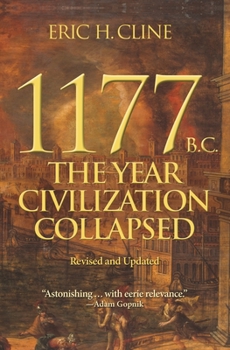1177 B.C.: The Year Civilization Collapsed: Revised and Updated
(Part of the Turning Points in Ancient History Series)
Select Format
Select Condition 
Book Overview
A bold reassessment of what caused the Late Bronze Age collapse
Format:Paperback
Language:English
ISBN:0691208018
ISBN13:9780691208015
Release Date:February 2021
Publisher:Princeton University Press
Length:304 Pages
Weight:0.66 lbs.
Dimensions:0.8" x 5.3" x 8.1"
Customer Reviews
1 rating
The End of the Bronze Age Provided a New Beginning for Mankind
Published by bill greene , 8 months ago
Eric Cline has provided a grand review of the 2nd millennium BC, an era that marked the end of the Bronze Age, and he introduces his readers to a thriving group of nations that traded closely with each other, except when they weren’t engaged invading and destroying each other. The people of those nations lived on the Eastern shores of the Mediterranean Sea, extending into the lands of the Middle East. and most of them honored the whims of dozens of pagan Gods. The author details the lives of their people, the wars that constantly ravaged their homelands, and the successes and failures of the governing classes. Emphasis is placed on how it all ended, with the Bronze Age collapsing about 1200 BC, caused by a widespread decline in fortunes of the major civilizations that had been flourishing there for a thousand years.
The subsequent couple hundred years has been called the First Dark Age because after the collapse, the magnificence of the large Empires ended and it took a few centuries before the initial success of the Greek people appeared in the 9th century BC and led to the magnificent glory of ancient Greece and the Hellenic world. History does repeat itself, and the Greek/Roman world that flourished from about 800 BC to 450 AD also collapsed and brought on the 2nd Dark Age. It is interesting to note that both of these recurring Dark ages were not totally “dark” and both led to a new and better world, with higher human achievements, and ever so gradually, an increased demand for human rights and equality that democratic systems provided. In essence each Collapse and Dark Age allowed a new and better advance for mankind.
The major empires were the Babylonians, Egyptians, Mycenaeans, Macedonians, Hittites, Mitanni, and Assyrians. The author explores the many reasons that have been given for their sudden and widespread collapse and he does it in 187 pages, all supplemented by 90 pages of notes, bibliography, and an index. In the 2021 revised edition, the author explains that the “collapse” of those Bronze Age Civilizations occurred over a fifty year or longer period, caused by invasions, revolutions, earthquakes, droughts, and civil strife. He cites 1177 BC as the final tipping point after the Hittites and Egyptians fought a war, exhausting the parties, and a wave of immigrants moved into the weakened states.
Those invaders arriving just before and after 1200 BC included the Philistines, the “Sea People,” and refugees from Greece and Crete, ushering in a Dark Age that lasted until the beginning of Greek city states more than 300 years later. The author points to other collapses in history such as the Mayan in Central America, the Indus Valley, and Old Egypt, explaining the similarities, and how historians have attributed such collapses to “a perfect storm” of contributing factors. One factor frequently cited by the author is that many of the Bronze Age cities were simply “abandoned,” presumably for a variety of reasons such as invasion, pestilence, drought, or revolution.
Douglas Preston, a historian studying the remains of the Mayan cities that collapsed around 600 AD, concluded that abandonment was the prime cause for their collapse. In The Lost Cities of the Monkey Gods, he concluded that a severe drought, lasting many decades, had depleted the food supply of the inhabitants. Because these were autocratic cities, the elites had appropriated most of the produce provided by the people who worked the farms and fields. Examination of their ancient cemeteries indicated that the common people’s remains indicated serious dietary deficiencies that had weakened the people for decades before the final fall.
Preston concluded that eventually, the remaining starving workers simply abandoned their homes and sought better places to live where they could scratch out a living for their families. The ruling elites, who knew nothing about doing anything practical or useful, had to then fend for themselves. Thus, for autocratic societies,





